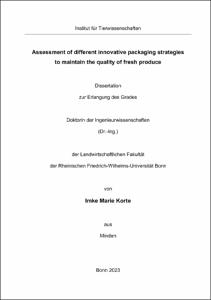Korte, Imke Marie: Assessment of different innovative packaging strategies to maintain the quality of fresh produce. - Bonn, 2023. - Dissertation, Rheinische Friedrich-Wilhelms-Universität Bonn.
Online-Ausgabe in bonndoc: https://nbn-resolving.org/urn:nbn:de:hbz:5-73393
Online-Ausgabe in bonndoc: https://nbn-resolving.org/urn:nbn:de:hbz:5-73393
@phdthesis{handle:20.500.11811/11176,
urn: https://nbn-resolving.org/urn:nbn:de:hbz:5-73393,
doi: https://doi.org/10.48565/bonndoc-174,
author = {{Imke Marie Korte}},
title = {Assessment of different innovative packaging strategies to maintain the quality of fresh produce},
school = {Rheinische Friedrich-Wilhelms-Universität Bonn},
year = 2023,
month = dec,
note = {The objective of this thesis was to assess the influence of different innovative packaging strategies on typical quality parameters of fresh produce and thus to keep and even improve the resource efficiency in food supply chains. First, the status quo and current practical use of bio-based polymers were analyzed; in terms of fundamental packaging functions and industrial applicability. Additionally, plant extracts as active packaging agents (capable of prolonging the food shelf life) were considered, and the adoption potential of packaging based on polymers from renewable resources was discussed from a bioeconomic perspective. The practical trials comprised studies to analyze the impact of innovative packaging strategies on quality changes of fresh cherry tomatoes as well as emulsion-type sausage. The use of both bio-based materials and fossil-based materials (multi-layers with reduced material thickness and a recyclable mono-layer) was assessed. Next, product-specific quality parameters and general packaging characteristics were investigated. Furthermore, the antimicrobial activity of coatings under development, containing a mineral binder based on liquid potassium silicate, non-conserved acrylate polymers, and non-conserved styrene-acrylate polymers, was analyzed.
Literature research showed that numerous (bio-based) materials are under development that provide significant opportunities to current fossil-based packaging in terms of sustainability and biocompatibility. Nevertheless, their use in industrial applications is often restricted due to various factors, such as poor commercial availability, insufficient material properties, high costs, and lower performance in fundamental packaging functions, which negatively impact shelf life, and thus the amount of food waste. The conducted product studies with tomatoes showed that the moisture absorption of the materials in particular had an influence on quality changes. Groundwood pulp and sugar cane showed promising preserving characteristics of fresh cherry tomatoes and pointed to the advantages of using this kind of bio-based packaging material, even from an economical and sustainable perspective. The product studies with emulsion-type sausage showed that sufficient barrier properties of both under and upper foil are crucial in keeping product quality during storage. So far, the practical implementation of fossil-based multi-layers with reduced material thickness and recyclable mono-layers is still challenging and remains highly case-dependent and may represent a promising alternative for replacing conventionally used multi-layer packaging. The analyzed organic coatings showed high antimicrobial activity against several microorganisms. These findings underline the potential of these coatings as a new antimicrobial material for different applications, such as antimicrobial packaging and antimicrobial food contact surfaces, to increase the safety and quality of perishable products and reduce waste.},
url = {https://hdl.handle.net/20.500.11811/11176}
}
urn: https://nbn-resolving.org/urn:nbn:de:hbz:5-73393,
doi: https://doi.org/10.48565/bonndoc-174,
author = {{Imke Marie Korte}},
title = {Assessment of different innovative packaging strategies to maintain the quality of fresh produce},
school = {Rheinische Friedrich-Wilhelms-Universität Bonn},
year = 2023,
month = dec,
note = {The objective of this thesis was to assess the influence of different innovative packaging strategies on typical quality parameters of fresh produce and thus to keep and even improve the resource efficiency in food supply chains. First, the status quo and current practical use of bio-based polymers were analyzed; in terms of fundamental packaging functions and industrial applicability. Additionally, plant extracts as active packaging agents (capable of prolonging the food shelf life) were considered, and the adoption potential of packaging based on polymers from renewable resources was discussed from a bioeconomic perspective. The practical trials comprised studies to analyze the impact of innovative packaging strategies on quality changes of fresh cherry tomatoes as well as emulsion-type sausage. The use of both bio-based materials and fossil-based materials (multi-layers with reduced material thickness and a recyclable mono-layer) was assessed. Next, product-specific quality parameters and general packaging characteristics were investigated. Furthermore, the antimicrobial activity of coatings under development, containing a mineral binder based on liquid potassium silicate, non-conserved acrylate polymers, and non-conserved styrene-acrylate polymers, was analyzed.
Literature research showed that numerous (bio-based) materials are under development that provide significant opportunities to current fossil-based packaging in terms of sustainability and biocompatibility. Nevertheless, their use in industrial applications is often restricted due to various factors, such as poor commercial availability, insufficient material properties, high costs, and lower performance in fundamental packaging functions, which negatively impact shelf life, and thus the amount of food waste. The conducted product studies with tomatoes showed that the moisture absorption of the materials in particular had an influence on quality changes. Groundwood pulp and sugar cane showed promising preserving characteristics of fresh cherry tomatoes and pointed to the advantages of using this kind of bio-based packaging material, even from an economical and sustainable perspective. The product studies with emulsion-type sausage showed that sufficient barrier properties of both under and upper foil are crucial in keeping product quality during storage. So far, the practical implementation of fossil-based multi-layers with reduced material thickness and recyclable mono-layers is still challenging and remains highly case-dependent and may represent a promising alternative for replacing conventionally used multi-layer packaging. The analyzed organic coatings showed high antimicrobial activity against several microorganisms. These findings underline the potential of these coatings as a new antimicrobial material for different applications, such as antimicrobial packaging and antimicrobial food contact surfaces, to increase the safety and quality of perishable products and reduce waste.},
url = {https://hdl.handle.net/20.500.11811/11176}
}






